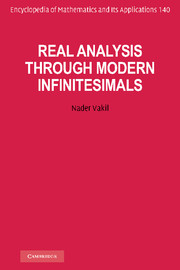Book contents
- Frontmatter
- Contents
- Preface
- Introduction
- PART I ELEMENTS OF REAL ANALYSIS
- PART II ELEMENTS OF ABSTRACT ANALYSIS
- 10 Point set topology
- 11 Metric spaces
- 12 Complete metric spaces
- 13 Some applications of completeness
- 14 Linear operators
- 15 Differential calculus on ℝn
- 16 Function space topologies
- Appendix A Vector spaces
- Appendix B The b-adic representation of numbers
- Appendix C Finite, denumerable, and uncountable sets
- Appendix D The syntax of mathematical languages
- References
- Index
13 - Some applications of completeness
from PART II - ELEMENTS OF ABSTRACT ANALYSIS
Published online by Cambridge University Press: 05 January 2013
- Frontmatter
- Contents
- Preface
- Introduction
- PART I ELEMENTS OF REAL ANALYSIS
- PART II ELEMENTS OF ABSTRACT ANALYSIS
- 10 Point set topology
- 11 Metric spaces
- 12 Complete metric spaces
- 13 Some applications of completeness
- 14 Linear operators
- 15 Differential calculus on ℝn
- 16 Function space topologies
- Appendix A Vector spaces
- Appendix B The b-adic representation of numbers
- Appendix C Finite, denumerable, and uncountable sets
- Appendix D The syntax of mathematical languages
- References
- Index
Summary
Baire category theorem
In the space 〈ℝ, O〉 some sets may be regarded as “thin” and some as “thick.” For example, finite sets and the set ℤ are thin but intervals and open sets are not. The Baire category theory provides a precise definition of these concepts and includes the result that, in a complete metric space, each nonempty open set is a “thick” set.
The historical roots of Baire category theory lie in the last two decades of the nineteenth century and are associated with the characterization of the set Df of discontinuity points of a Riemann integrable function f. The question was, how thick could Df be. It is not perhaps an exaggeration to assert that modern mathematical analysis evolved from two strands of investigations into that question. In one strand, the notion of a measure-zero set (see Definition 7.4.8) was discovered; the other strand started from the notion of a nowhere-dense set (defined below) and sought to find a topological characterization of Df. The first strand led to the creation of modern integration theories and the second gave rise to the subject of point-set topology, which provides a framework for mathematical theories that treat functions as points in an abstract space with geometric and algebraic properties.
Information
- Type
- Chapter
- Information
- Real Analysis through Modern Infinitesimals , pp. 433 - 442Publisher: Cambridge University PressPrint publication year: 2011
